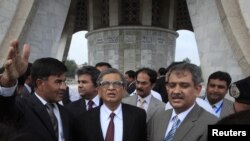ISLAMABAD, PAKISTAN —
Analysts say that warming ties between India and Pakistan in recent months are especially important for Afghanistan as foreign troops prepare to leave in the coming year. There are myriad ways that relations between the arch-rivals affect the entire region.
After years of sour relations and three wars, neighbors Pakistan and India this month agreed to ease visa restrictions between their countries, allowing more cross-border travel.
The small - yet symbolic - development comes at an important political time, as cooperation between Islamabad and New Delhi is seen as key to Afghanistan’s future. Ahmad Majidyar of the American Enterprise Institute in Washington explains the importance.
“As far as Afghanistan is concerned, both Islamabad and New Delhi are pursuing divergent interests, so a normalization of ties between India and Pakistan will put an end to the proxy wars that are happening in Afghanistan and will lead to stability in the country,” said Majidyar.
Ties to militant groups
India and Pakistan have accused each other of backing different militant groups as subversive tools of their nations’ foreign policy.
The so-called Haqqani network, reportedly based in northwestern Pakistan, is one of the most powerful militant factions in Afghanistan and is believed to have links to the Pakistani military.
Majidyar said improving ties with India, however, could lead Pakistan to distance itself from the Haqqani group.
“The reason that the Pakistanis still see the Haqqani network and the Taliban in general as strategic assets for their interests in Afghanistan - one reason is India. So if there is any improved relations between India and Pakistan, that would put an end to those calculations,” said Majidyar.
India still maintains serious concerns over Lashkar-e-Taiba, the militant group in Pakistan accused of perpetrating the 2008 Mumbai attacks.
Hassan Abbas, senior adviser at the Asia Society in Washington, said the way in which Pakistan addresses its relationship with these militant groups is a key factor for its external relations.
“The peace process in South Asia is linked to how militant groups are dealt with, and linked to the situation in Afghanistan,” said Abbas.
Trending in right direction
There are signs that Pakistan is taking some steps toward outlawing militant groups that long have been tolerated by the government.
Pakistan has been strengthening its own antiterrorism laws to deal with militants regularly killing soldiers and civilians, but analysts say it is still too early to determine if they will be effectively implemented.
Ayesha Siddiqa, an independent security analyst in Islamabad, said the warming ties with India and changing attitude toward domestic militants points to a positive trend, but a limited one.
“These are small building blocks. One hopes that eventually it all comes together and improves the regional situation, but for the time being they are small initiatives,” said Siddiqa.
Siddiqa said much more still has to be done before there is a solution to the region's long-running conflicts.
After years of sour relations and three wars, neighbors Pakistan and India this month agreed to ease visa restrictions between their countries, allowing more cross-border travel.
The small - yet symbolic - development comes at an important political time, as cooperation between Islamabad and New Delhi is seen as key to Afghanistan’s future. Ahmad Majidyar of the American Enterprise Institute in Washington explains the importance.
“As far as Afghanistan is concerned, both Islamabad and New Delhi are pursuing divergent interests, so a normalization of ties between India and Pakistan will put an end to the proxy wars that are happening in Afghanistan and will lead to stability in the country,” said Majidyar.
Ties to militant groups
India and Pakistan have accused each other of backing different militant groups as subversive tools of their nations’ foreign policy.
The so-called Haqqani network, reportedly based in northwestern Pakistan, is one of the most powerful militant factions in Afghanistan and is believed to have links to the Pakistani military.
Majidyar said improving ties with India, however, could lead Pakistan to distance itself from the Haqqani group.
“The reason that the Pakistanis still see the Haqqani network and the Taliban in general as strategic assets for their interests in Afghanistan - one reason is India. So if there is any improved relations between India and Pakistan, that would put an end to those calculations,” said Majidyar.
India still maintains serious concerns over Lashkar-e-Taiba, the militant group in Pakistan accused of perpetrating the 2008 Mumbai attacks.
Hassan Abbas, senior adviser at the Asia Society in Washington, said the way in which Pakistan addresses its relationship with these militant groups is a key factor for its external relations.
“The peace process in South Asia is linked to how militant groups are dealt with, and linked to the situation in Afghanistan,” said Abbas.
Trending in right direction
There are signs that Pakistan is taking some steps toward outlawing militant groups that long have been tolerated by the government.
Pakistan has been strengthening its own antiterrorism laws to deal with militants regularly killing soldiers and civilians, but analysts say it is still too early to determine if they will be effectively implemented.
Ayesha Siddiqa, an independent security analyst in Islamabad, said the warming ties with India and changing attitude toward domestic militants points to a positive trend, but a limited one.
“These are small building blocks. One hopes that eventually it all comes together and improves the regional situation, but for the time being they are small initiatives,” said Siddiqa.
Siddiqa said much more still has to be done before there is a solution to the region's long-running conflicts.





